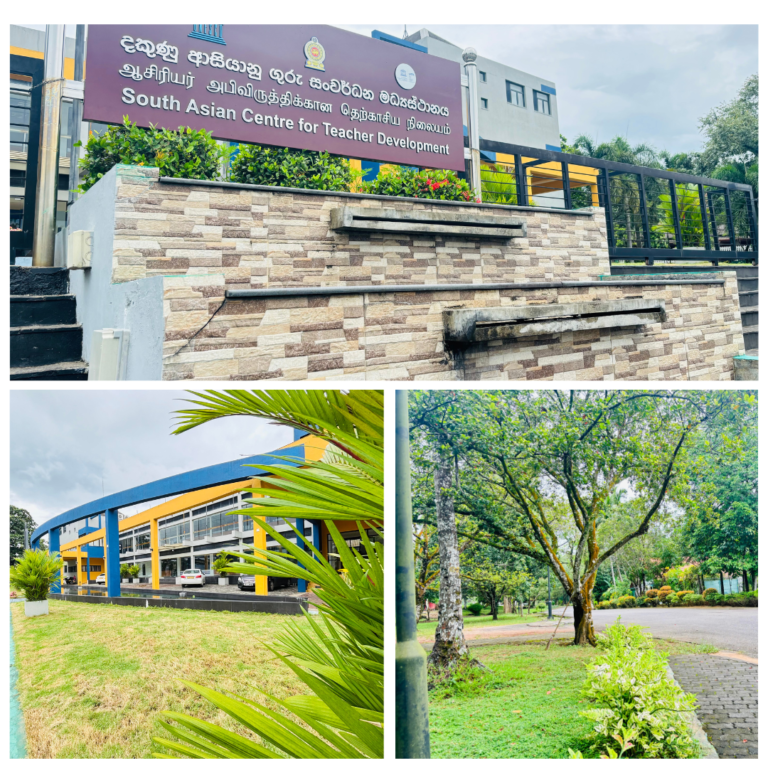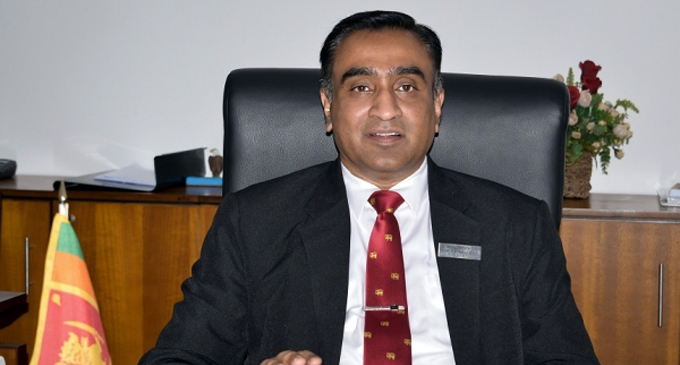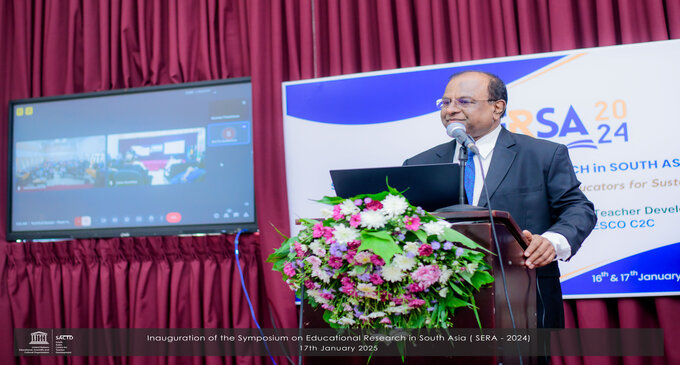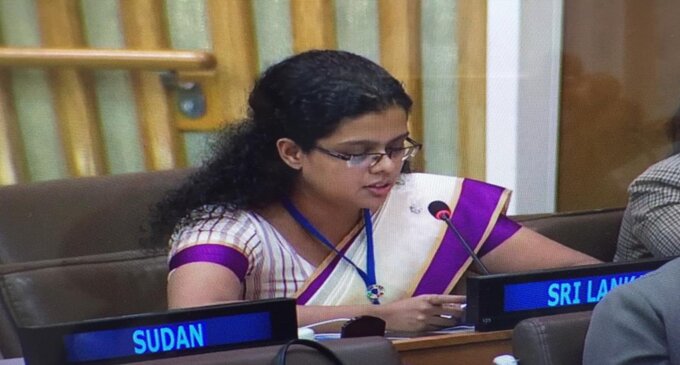About Us

A few words
South Asian Centre for Teacher Development
The South Asian Centre for Teacher Development (SACTD) is a UNESCO Category 2 Center based in Meepe, Sri Lanka, dedicated to advancing teacher education across South Asia. Established under the auspices of UNESCO and the Government of Sri Lanka, SACTD strives to meet the educational objectives of Sustainable Development Goal 4, focusing on quality, inclusive, and equitable education.
Since 2014, we have been committed to fostering innovative and socially responsible educators through rigorous training programs and collaborations with leading institutions in the region. As a self-sustaining organization, SACTD supports the professional growth of teachers by addressing essential competencies in modern education, including digital pedagogy, social-emotional learning, and media literacy.
Our mission is to equip teachers, trainers, and mentors to unlock the potential of every child, promoting intellectual and moral solidarity. With a roadmap leading to 2027, SACTD is dedicated to becoming a regional leader in teacher professionalism, upholding values of integrity, cooperation, and diversity in all our initiatives.
SACTD Values
- Supportive and Responsive – We would be highly responsive and supportive, engaging, outward looking, stay relevant and observe professionalism and excellence in everything we do.
- Adaptability and Innovation – We believe that the change is a constant and therefore, we foster a culture of innovation and adaptability.
- Cooperation – We build strong networks and relationships collaboratively and we act, work, create and build together for the benefit of humanity.
- Trust and Integrity – We would be open, honest, positive and credible. We would do the right thing in the right way, in a transparent manner adhering to SACTD values that we strongly hold.
- Diversity – We embrace diversity at all times and it is our habit getting to know and appreciate people of different cultures, religions, ethnic groups, socio-economic groups, or ages and liberate their potential.
SKRA 1:Education, Training and Development
Goal 1: Improved quality of Teacher Training and Development
Goal 2: 12,000 teacher trainers, mentors and counsellors be trained by end of 2027
SKRA 2: Research on Teacher Development and Training
Goal 3: New knowledge and dissemination of the new knowledge on Teacher development and training.
SKRA 3: Curriculum Development and Text Book Writing
Goal 4: Improved access to new curriculum and Text books on teacher development
SKRA 4: Open Distance Learning and Repository Services
Goal 5: Increased access to knowledge and skills to teacher trainers on open distance learning modes
Goal 6: Improved repository services to teacher trainers, policy makers and other stakeholders
SKRA 5: SACTD Centre of Excellence and Brand Building
Goal 7: Autonomy of SACTD and Brand Building:
Increased recognition and acceptance of SACTD by the educators in SAARC countries, the respective Governments and public sectors, educators, the teacher trainers and public.
Proposed Strategies
In order to achieve the Goals and Objectives set above, the following Strategies have been identified for implementation.
Main areas of focus are:
1.1: Offering practical, relevant and future education focused curricula, course work and teacher development programs;
1.2: Development of suitable and future focused curricula;
1.3: Offering attractive and teacher -trainer focused Teaching and Learning process;
1.4: Increasing access to teacher trainers for learning and following SACTD course work (e.g., On-line training);
1.5: Strong partnerships with other teacher training institutions (TTIs) for improving quality and coverage of subject matter;
1.6: Strong partnerships with teacher training institutions/training schools and education authorities for enhanced and secured clientele; and
1.7: Promote E-learning and e-pedagogy.
Strategies to achieve the above goal are:
- Up-to-date technology in the SACTD class rooms (with proper equipment, use of computers by trainees, use of other tools such as Excel, MS Word, PPT etc.);
- Maintain the Curricula and course work in a most suitable, practical and attractive manner (revise, introduce and enhance. E.g., New Courses to suit current needs);
- Enhanced access to curricula, course materials and all other materials;
- Improved quality of teaching and learning process at the teaching institutes;
- Improved access to classes, education workshops and friendly atmosphere (e-learning, online classes, distance learning and seminars);
- Focus on improving trainers’ ability and skills in working with and use of IT;
- Standardization of courses with international institutions;
- Scheme of endowments / Scholarships; and
- Promotion, marketing and improved recognition.
Targets: 750 in 2023, 2,000 in 2024, 2,500 in 2025, 3,250 in 2026 and 3,500 in 2027
Approximate proportions from each of the target markets are as follows:
- 30% from the local teacher trainers and teachers both from public and private sectors,
- 40% from India,
- 30% from other SAARC countries and other countries.
Main areas of focus are:
2.1: Increased awareness of SACTD among teaching professionals and educational authorities.
2.2: Improved facilitation for registration, travel, accommodation etc.
2.3: Conduct of courses with an exceptional quality
2.4: Networking with schools, education authorities and education training providing institutions
2.5: Strong partnerships with other institutions
Strategies to achieve this goal are:
- Promote SACTD among education authorities, training providers and private school management bodies;
- Undertake a digital-social marketing campaign;
- Scholarships and other assistance for needy trainers;
- Improve awareness among teacher trainers;
- Easing and facilitation of the registration process;
- Networking with other institutions that provide teacher education courses and programs (E.g., Universities).
Target: Complete at least 5 researches p.a. by SACTD which leads to new knowledge and publish them in leading magazines and disseminate the findings at internal forums
Main area of focus is:
3.1: Funding for research through scholarships, endowments and grants
3.2: Facilitation in conducting the research, surveys and studies
3.3: Facilitation in publishing and dissemination
3.4: Increased use and adoption of new knowledge in SACTD programs and activities
Strategies to achieve this Goal are:
- Institutionalizing a system to secure and provide financial assistance for research, studies and surveys
- Institutionalise a system to support and facilitate c research, studies and surveys
- Institutionalise a system for publishing and dissemination
- Institutionalise a system to use and adopt new knowledge at SACTD programs and activities as well as by the education systems in SAARC countries
Goal 4: Improved access to new curriculum and Text books on teacher development
Main area of focus is:
4.1: Development of new curricula and revision of existing curricula
4.2: Publicising and adoption
4.3: Review, feedback and revision/upgrading of curricula
4.4: Text book writing and publishing
Strategies to achieve this Goal are:
- Undertaking the needs assessment;
- Proper planning and resources allocation;
- Content development, pilot delivery and revision;
- Completed curriculum package and publicising; and
- Text book writing and publishing
Goal 5: Increased access to knowledge and skills to teacher trainers on open distance learning modes
Though the trainees prefer face-to-face education/training, online learning is beneficial for compensating for difficulties in travelling long distances or cost of travel and accommodation particularly travel between SAARC countries.
Main area of focus is:
5.1: Development of online / distance learning courses and programs
5.2: Awareness and popularization of online / distance learning courses among the teacher trainers
5.3: Effective and efficient conduct of the online / distance learning courses and programs
5.4: Effective monitoring, feedback and evaluation on the above courses and programs
Strategies to achieve this Goal are:
- Development of online / distance learning courses and programs based on the specific needs of the trainers and educators in the SAARC countries;
- Increased awareness and knowledge about the above courses among the educators in SAARC countries .
- Effective and efficient delivery of courses and programs
- Monitoring, feedback and evaluation of the above courses and programs;
- Periodical assessment, upgrading and revision; and
- Networking with institutions and outsourcing of leading online / distance learning courses of teacher trainer training
Goal 6: Improved repository services to teacher trainers, policy makers and other stakeholders.
Though the trainees prefer face-to-face education/training, online learning is beneficial for compensating for difficulties in travelling long distances or cost of travel and accommodation particularly travel between SAARC countries.
Main area of focus is:
6.1: Develop SACTD digital platform for the repository
6.2 Improved access to research and other teacher-training, trainer training, and teaching related outputs
6.3: Effective dissemination of valuable/new research findings
6.4: Effective management of repository
Strategies to achieve this Goal are:
- Proper licensing and structural development (proper features and settings)
- Developing the SACTD repository to have access with an ability of providing information from leading international repositories and own SACTD knowledge base/knowledge products
- Developing proper policy framework for SACTD repository
- Increased networking with other leading repositories
- Enhanced awareness, use and popularity of SACTD repository
- Effective O&M on continuous basis and periodical upgrading of the same
Goal 7: Autonomy of SACTD and Brand Building
7.1: Autonomy & legal status
7.2: Leasing of assets by NIE;
7.3: Increased recognition and acceptance of SACTD by the Industry, Public Sector, Students and the Government.
7.4: Improve relationships with key local, regional and international bodies and enhance Industry connectivity;
7.5: Increase the knowledge of the private sector and State sector management on use of Cost and Management Accounting theory and principles as a management tool, in their day-to-day functions;
7.6: Improved infrastructure and other facilities including and new building for SACTD;
7.7: Exemplary Customer Service at SACTD.
Strategies to achieve this Goal are:
- Incorporation of SACTD as a company limited by guarantee;
- ILeasing of assets to SACTD by NIE;
- IEffective marketing campaign;
- IPromotion of SACTD in the private and public sector;
- IReview of job advertisements and follow-up on recognition of SACTD qualification;
- IPromotion for international markets (SLBFE, foreign missions);
- INetworking with key local, regional and international institutions;
- IPromotion of success stories and best performers on mass-media;
- IEffective use of annual conference, other events, SACTD web-site and social marketing; and
- IResearch and studies and publications
- IDevelopment of infrastructure requirements (at H/Q) and other facilities (Library, Lecture-theatres and seminar facilities and Computer Centre/lab) to meet the future demands;
- IImproved communication: Comprehensive web-site with all relevant information and other facilities such as e-learning facilities Web-based programs, online assessments, online registration, interactive sessions etc.;
- IImproved HRD/HRM at SACTD; (Training of SACTD staff);
- IDesigning and institutionalizing sound internal control systems;
- IImproved support services – Research and Studies Unit, Career Guidance Unit and Registration and Establishment Unit; and
- IInformation systems and improved procedures (Academic Management Information System (AMIS), Monitoring and Evaluation (M&E) system etc. and internal procedures).I
Strategic Focus of SACTD
The SACTD should be the Centre of Excellence in Teacher-Trainer Development and Teacher Training in Asia so that it becomes:
- An exemplar of and benchmark for developing and grooming teachers
- Trend setter in teacher development
- Setter of Teacher Training Quality Standards
- Effective and exemplar change leader
- One of the lead partners in the child development, education and human development
Teacher-Trainer Courses
Strategies to achieve this Goal are:
- Short-term Courses– Five core subjects on Teacher Development are: (i) Understanding Educational Outcomes, (ii) Managing for Educational Results, (iii) Student Performance Assessment, (iv) Bilingual and Inclusive Education and (v) Teacher Standards. These also include the courses that are conducted in collaboration with other institutions such as RMIT, Australia.
- Teacher-Trainer Certificate Course – These are three months courses which transforms a general teacher trainer in to a proper trainer by inculcating necessary skills and competencies on teacher training.
- Teacher-Trainer Diploma Course – These are 6 months course and cover essentials of teacher training. The completed trainers will be equipped with all necessary skills and competencies to effectively and efficiently conduct teacher training courses and programs. This is a specially develop training course for the persons wish to pursue a career in teacher training. The course will cover aspects such as Physical, Mind Development and child Psychology of Pre-Childhood, Methods and new tendencies propensities of Education, Effective Practical Syllabus for Pre-School and Primary Education, Management of Primary Schools and sections, Health, Nutrition and Development, Child protection, caring and recognition of children who wants to pan the special attention and adaptation of English for Pre-School and Primary Education. This certificate provides NVQ level 4 recognition.
- Teacher-Trainer Higher Diploma Course – Higher Diploma course in teacher training is 9 months to 12 months course and is specially designed for those who are already engaged in training of teachers. Those who complete this course will have necessary skills and competencies to develop and conduct training programs to suit the needs and the context of their respective educational sectors. This certificate provides NVQ level 5 recognition .
- ECD Teacher Training / Trainer Teaching – There courses are targeted for ECD teachers and trainers of ECD teachers. These are short term courses and will primarily be focusing on standardising the ECD learning instantiates which are implemented mostly by the non-governmental players such as private early child education centres, NGOs and semi-governmental organizations such as local government authorities.
Teacher Training Certificate Course (TTCC) of the RMIT University, Australia
SACTD Computer Centre
Our Vision & Mission
Our Vision
SACTD, the Preferred Choice of Educators in ensuring that the potential of every child is liberated
Our Mission
We train and develop Teacher Trainers, Mentors and Counsellors who are innovative, ethically and socially responsible and contributing to liberate the intellectual and moral solidarity of humanity
Board of Management




Mr. Nalaka Kaluwewa – Secretary to the Ministry of Education, HE&VE
Mr. Tim Curtis – The representative of the Director, General of UNESCO
Mr. Viraj Singh – Representative of the Government of India
Dr. Fathmath Nishan -Representative of the Government of Maldives



Mr. Zahirul Islam -Representative of the Government of Bangladesh
Prof. Manjula Vidanapathirana – Director General, National Institute of Education
Mr. H.T. Kamal Pathmasiri – Director General, SACTD
Board of Directors




Mr. Nalaka Kaluwewa – Secretary to the Ministry of Education, HE&VE
Prof. Manjula Vidanapathirana – Director General, National Institute of Education
Mr. R.K.R.R Ranaweera – Additional Director General Department of Trade and Investment Policy
Ms. Dilini Jayamali – Director General, Nations and Human Rights Division Ministry of Foreign Affairs

Mr. Kamal Pathmasiri – Director General, SACTD
Top Management








